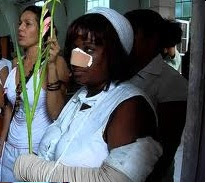Empty lenses and blocked wagons
Raúl Rivero
Madrid – It now appears that the stubborn, closed, dogmatic, blind that will not see the changes of the Cuban regime are the human rights activists, the Ladies in White, independent journalists, former political prisoners and opponents will wake up tomorrow under a repressive atmosphere that continues. It ensures that there is a lack of main focus to see the reality of life, as if the beatings, the dungeons, the repudiation rallies and harassment were shadows from the past.
 That is the tendency among some natives and foreign scholars, teachers and philosophers, “bishops and ambassadors,” as José Martí says in the poem The Girl from Guatemala.
That is the tendency among some natives and foreign scholars, teachers and philosophers, “bishops and ambassadors,” as José Martí says in the poem The Girl from Guatemala.
It is also a school of thought in the complex and varied waves of those who suffer fully from the Stockholm syndrome and resent the critical and constant presence of the groups of men and women in Cuba who remember every day that taking sweet potatoes off the ration book and the capitalism of crappy food is one thing. is freedom is another.
A similar view, colored by the rules of politics or diplomacy that are expressed in a kind of embarrassing or almost clandestine solidarity, is that some politicians have a great international record of being Democrats. To them, the vicissitudes of power and finances give them special progressive lenses that have conveniently embedded clouds and clarities through which to observe the Cuban scene.
Yes, intellectuals and artists who were once jaded, out of fear or because they wanted to, they will soon get airplane tickets to not be late for that famous call which is still open by the Ministry of Culture: enjoy and dance to the National Symphony. And not a single word about the imprisonment of the writer Ángel Santiesteban and of Librado Linares, essayist and teacher, one of the Black Spring prisoners who refused to go into exile who suffers sieges and attacks on his home and family, off in Camajuaní.
Why not, this Sunday, after the persecutions, arrests, pushing and scuffles with police, the Ladies in White say something about the transformations.
The peaceful opposition, of course, react according to their experience and independent journalists tell the story of each day. They do not design episodes of paralysis and stagnation. They live and write.
This article was published in The New Herald on the 12th of August 2013
Translated by: Shane J. Cassidy
13 December 2013
